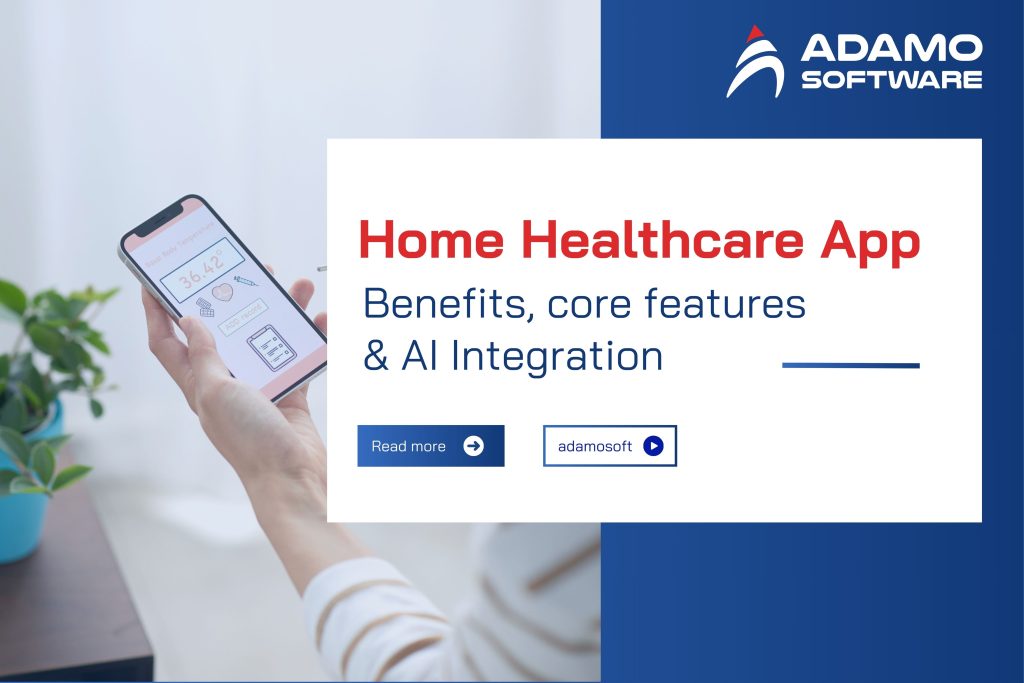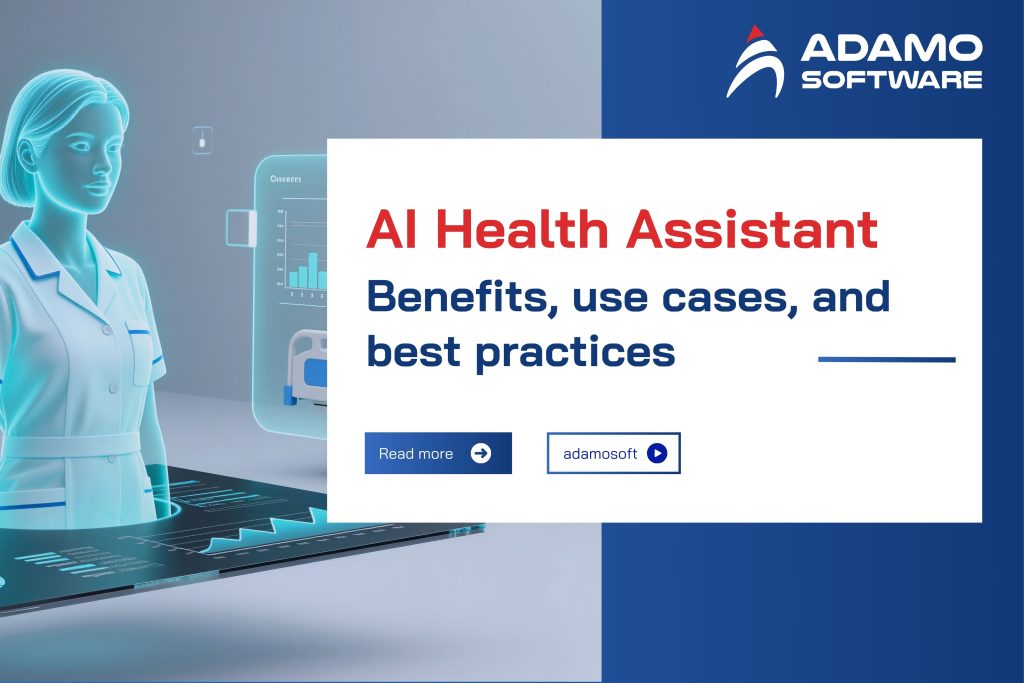Healthcare Cloud Services – How to Leverage Cloud Computing in Healthcare
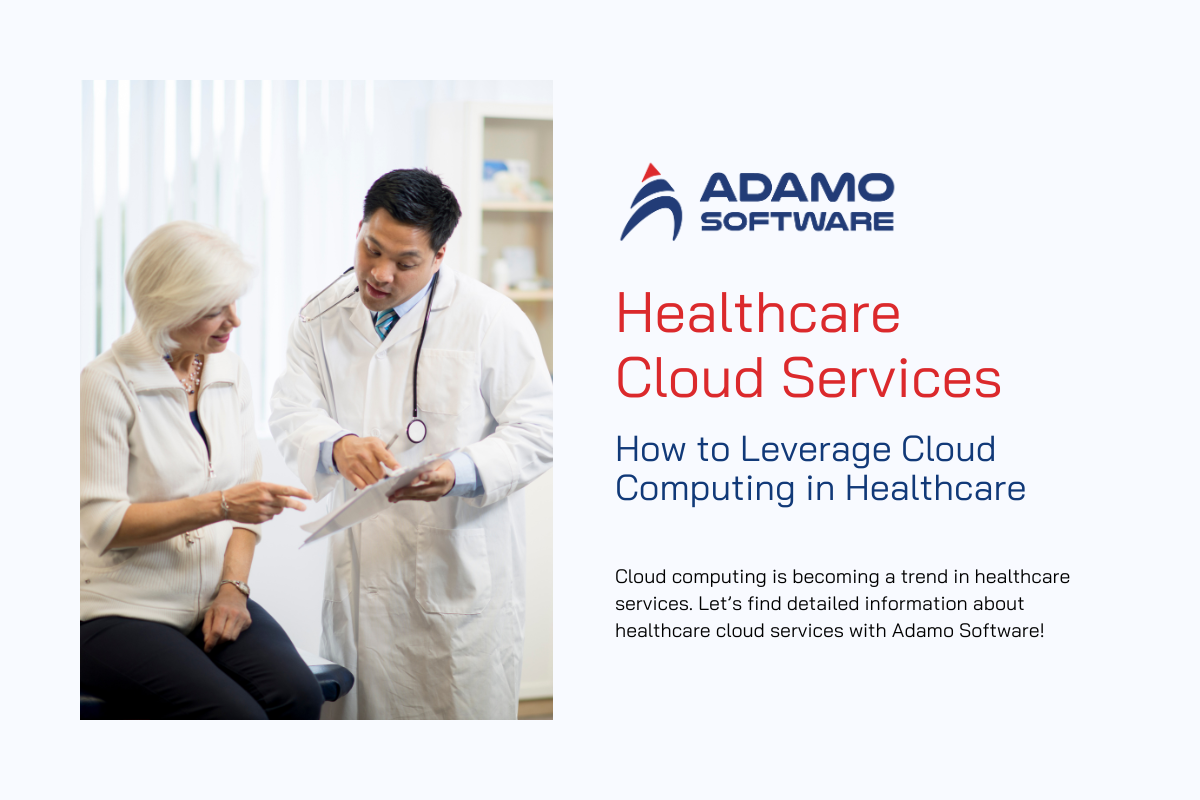
Cloud computing is becoming a trend in medicine and healthcare services. Medical facilities gradually turn to cloud computing to save costs, reduce procedure time, and improve medical examination and treatment efficiency. Cloud computing will synchronize medical records, examination, and treatment processes without too many complicated documents. So, what exactly are healthcare cloud services and their advantages? Let Adamo Software help you answer these questions.
Through this blog post, you will find detailed information on the definition of cloud computing in healthcare. Besides, the trends in the healthcare cloud computing market, and the benefits of healthcare cloud services are also discussed. In addition, Adamo also recommends suitable ways to use cloud services in the healthcare industry, some challenges to face when using cloud hosting for healthcare, and solutions to tackle these challenges. Read our post for more detailed, well-researched, and up-to-date information.
I. What is Cloud Computing in Healthcare
Cloud computing services in the medical field are how medical data is stored, managed, and processed through remote servers via the Internet. Compared to the traditional approach, there is no need for an on-premises data center on personal computers to store data. Thanks to this alternative approach, healthcare stakeholders can be flexible in assessing data stored on remote servers. Remote access to healthcare data makes location no longer a barrier to accessing medical services.
Companies specializing in healthcare cloud services will provide various solutions and services tailored to meet the unique needs of healthcare organizations. Cloud technology is a key tool for these companies, allowing them to provide efficient, secure, and high-quality healthcare. Both healthcare facilities and patients benefit from cloud computing. Clinics can securely use vast amounts of data from anywhere, at any time, improving patient care, streamlining operations, and automating many processes. For healthcare organizations, virtualization in the cloud helps optimize operating costs while allowing them to deliver high-quality, personalized care.
Cloud computing in healthcare includes many technologies, such as electronic medical records, remote medical examination, patient portals, and remote monitoring. Besides, connected devices that support the Internet of Things, collecting patient data from various sources, and analyzing big data are also cloud computing technologies. By enabling on-demand scaling and flexible resource allocation, cloud technology empowers healthcare providers to make data-driven decisions faster and more effectively.
Key components of cloud computing in healthcare include infrastructure as a service (IaaS), platform as a service (PaaS), and software as a service (SaaS). The IaaS offers access to virtual machines, storage, and other computing resources of the healthcare data through the web. PaaS provides a development environment in the cloud for healthcare facilities to build, run, and maintain their healthcare applications. Whereas, the SaaS creates cloud-based electronic health record solutions. With these solution, clinics and hospitals can access and manage patient records securely.
Overall, healthcare cloud services are gradually becoming popular helping healthcare facilities in many aspects. Let’s keep reading for some trends in the healthcare cloud computing market.
You can explore more about Hospital Management Systems: Types, Key Features & Must-Know Insights here.
II. A Look at Healthcare Cloud Computing Market Trends
The healthcare cloud computing market is undergoing a major transformation and experiencing significant growth. Technological advancements, evolving healthcare needs, and new regulations are some key changing characteristics. Key factors driving the growth of the healthcare cloud computing market include increasing access to advanced technology, such as machine learning, increasing adoption of information technology in the healthcare sector health, and the use of the cloud to reduce costs and improve scalability, storage, and flexibility. The market of healthcare cloud services is estimated to reach USD 49.14 billion by the end of 2024 and is projected to reach USD 83.93 billion by 2029, with a compound annual growth rate of 11,30% from 2024 to 2029. Over this period, North America is expected to be the largest market using healthcare cloud services.
In the future, cloud technology will continue to evolve to fit the unique digital health landscape with many technological advances. They include remote monitoring, language processing APIs natural and telemedicine, etc. Cloud services are now used by around 83% of healthcare businesses in North America, Asia Pacific, Europe, South America, and Middle East Asia and Africa regions.
In general, the healthcare cloud computing market is predicted to see more innovation and expansion, as healthcare facilities will continue to use healthcare cloud services. Increased adoption of telemedicine, electronic health records, big data analytics, and AI are some key trends shaping the market.
III. Benefits of Healthcare Cloud Services
Medical experts are increasingly adopting cloud technology in healthcare because of its benefits to patients and healthcare facilities. Regarding healthcare facilities, cloud computing applied in the medical industry helps cut operating costs and provide high-quality, personalized care. Thanks to the healthcare cloud services, patients who want immediate service can receive quick support. The cloud enhances patient engagement with health plans. Let’s find more details about the benefits of using cloud technology in healthcare.
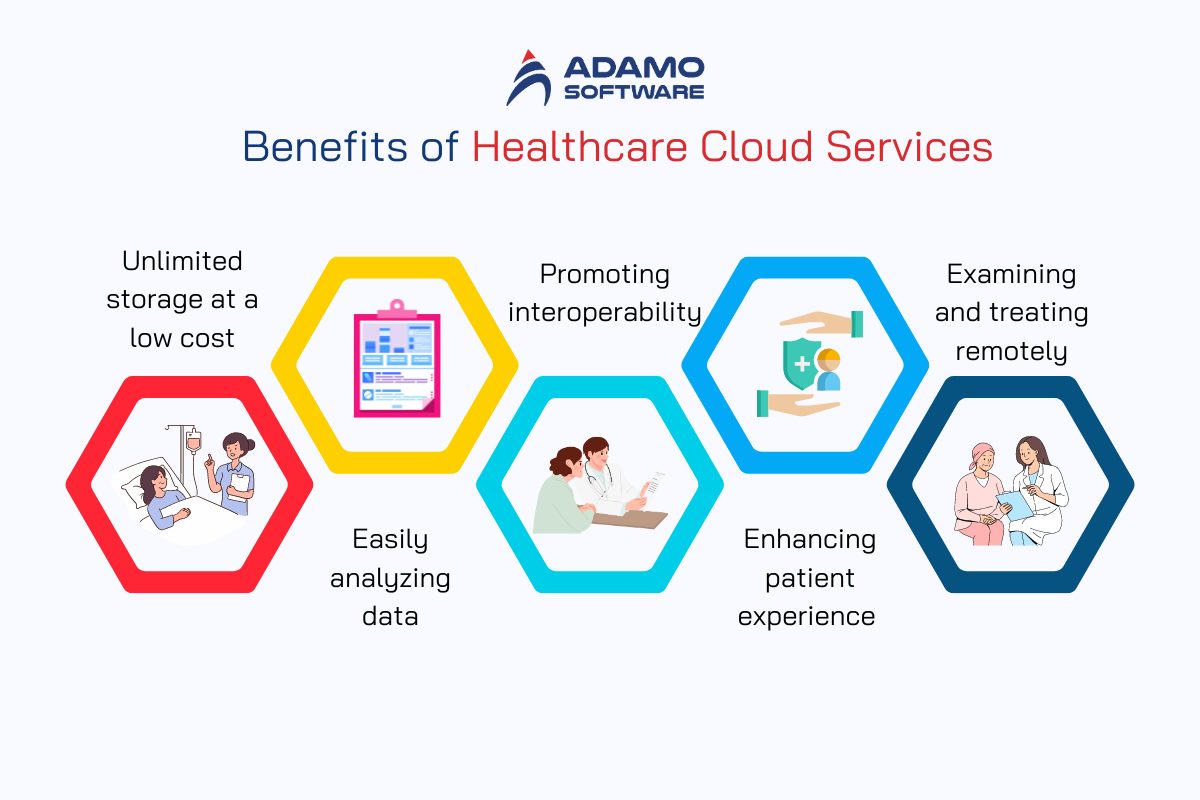
1. Unlimited storage at a low cost
In the healthcare sector, there are large amounts accumulated daily that need to be organized and stored securely. The cloud provides unlimited storage to maintain that data at a low cost. Healthcare facilities only need to pay for the number of resources they use. Healthcare cloud services provide better infrastructure and services than a medical facility’s traditional data storage systems such as hardware, external drives, or paper documents.
Based on the needs of the care providers, cloud storage can be scaled up or down. This enables care providers to manage and accommodate growing volumes of patient data, medical records, and imaging files. With no more paperwork, and no need to upgrade computer hardware, medical facilities can easily store all information and expand the data set through cloud computing.
It can be said that healthcare cloud services help to reduce the cost of using physical storage space. In addition, the operational costs for managing the storage infrastructure, including backups, security, and disaster recovery can also be cut down. Thanks to that, healthcare facilities can reduce the overall cost of storing data.
2. Easily analyzing data
Easily analyzing data is also among the benefits of healthcare cloud services. In addition to storing large amounts of data, cloud computing helps healthcare providers analyze these data sets and make critical decisions. Algorithms powered by Artificial Intelligence (AI) and Machine Learning (ML) with cloud technology will enhance medical research and deliver responsive treatments to doctors. The high-level computing capabilities of the cloud ensure the processing of huge data sets, both structured and unstructured. Cloud computing technology also analyzes patient data to identify possible future diseases which allows doctors to have more tailored care programs. With the advanced computing power of the cloud, processing large data sets becomes more feasible. This is the premise for building an effective personalized care plan for patients.
3. Promoting interoperability
Healthcare cloud services drive interoperability across the healthcare system. Therefore, patient data can easily be accessible for medical staff to distribute to stakeholders and quickly gain insights to provide timely treatment. Cloud computing services empower healthcare professionals to review cases and facilitate their views regardless of their geographical location. In addition, cloud computing in healthcare also enables the seamless transfer of data between different stakeholders. Cloud computing data helps doctors transmit patient data to each other quickly and smoothly. Thanks to that, the healthcare delivery process can be sped up; thereby bringing efficiency in the process.
4. Enhancing patient experience and satisfaction
Using the healthcare cloud services, patients will have the right to take control and make decisions regarding their health. Cloud computing in healthcare increases patient engagement by giving them real-time access to medical data, test results, and even doctor’s notes. Additionally, it gives patients the ability to check to avoid being over-prescribed and having to take unnecessary tests. Details of both patients and doctors can be found in medical records. For doctors, with information about the patient’s current situation, they can make informed treatment decisions, thereby providing better and more appropriate medical services to patients. Thanks to that, customer satisfaction with hospital services can be enhanced.
5. Examining and treating remotely
As mentioned, healthcare cloud services enable doctors to access patient’s data anywhere. Cloud-based telemedicine applications ensure increased accessibility, easy sharing of healthcare data, and efficient provision of coverage during treatment. Telemedicine or remote medicine is extremely convenient for providing healthcare services, while also improving the patient experience. Comfort, convenience, better assessments, primary care, and chronic condition management are some of the benefits of cloud-based telemedicine systems.
Overall, healthcare cloud services bring a significant change in the storage and sharing of medical data. By leveraging the benefits of these services, healthcare facilities can streamline operations, enhance patient care, and keep pace with changes in technology. Keep reading for detailed information on the usage of cloud services in the healthcare industry.
IV. How Healthcare Cloud Services are Used in this Industry
The use of cloud computing in healthcare is becoming increasingly popular around the world, especially after the COVID-19 pandemic. So, how cloud services are used in the healthcare industry?
1. On-demand telehealth remote care service
Telemedicine technology has become important, especially in areas where healthcare services are limited or inaccessible. Healthcare cloud services contribute to addressing this limitation. Cloud services support telemedicine platforms that enable virtual consultations, which reduces the need for in-person visits. Patient data will be transmitted to the cloud so that doctors can monitor, analyze, and provide continuous care outside traditional healthcare settings.
2. Electronic health records (EHR)
Electronic health records (EHR) represent the most common use of healthcare cloud services. Every individual can have a comprehensive digital health record, containing important information such as demographics, medical history, and test results. Also, medical histories and diagnoses are stored in the EHR. The electronic records are accessible to both public health care providers and owners. EHRs streamline healthcare processes by allowing doctors to make real-time updates without the need for traditional hard copies. At the same time, EHR also helps notify patients of scheduled tests and easily track prescriptions. Cloud services make exchanging patient information between disparate EHR systems become easier.
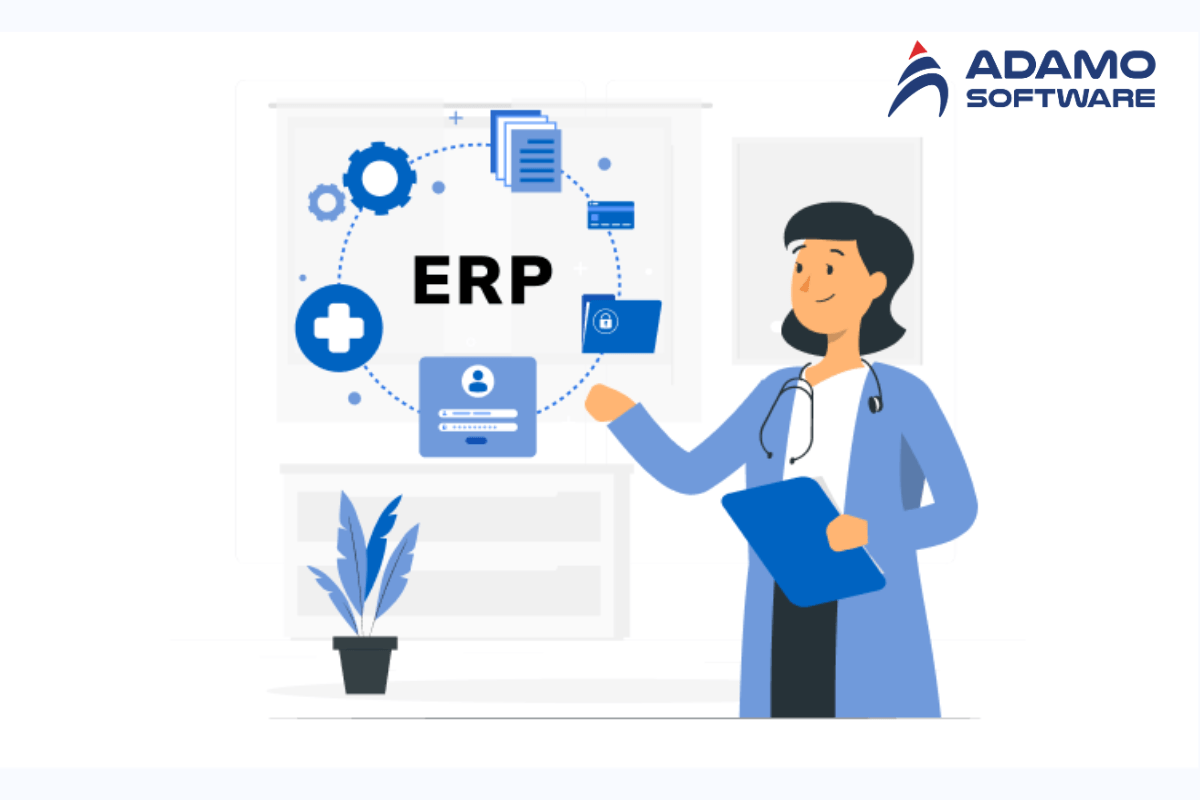
3. Robots for remote diagnosis, testing, and surgery
Deploying cloud robotics has helped healthcare facilities overcome geographical challenges, delivering optimal care to patients. Cloud services facilitate these robotic applications by remote diagnosis and testing. Regarding remote diagnosis and testing, telepresence robots help to remotely assess patient conditions and provide diagnoses. Besides, medical images, laboratory results, and other diagnostic data can be analyzed through the diagnostic robots using AI algorithms hosted on the cloud.
4. AR/VR application to improve patient experience
Healthcare cloud services can be used together with the application of Augmented Reality (AR) and Virtual Reality (VR) technologies to improve patient experience. AR and VR can create simulations and assessments for clinical procedures to educate healthcare professionals and improve the quality of health-related services. Cloud services support the application of AR and VR by storing and managing large volumes of data generated by AR/VR applications like 3D models, patient data, etc. In addition, cloud-based AR/VR applications make sharing data and experiences between different healthcare providers and institutions easier.
In general, cloud services can be applied in the healthcare industry in many ways. No matter what usages of the healthcare cloud services are, they can bring benefits to the treatment centers.
V. Challenges of Healthcare Cloud Services
Although healthcare cloud services bring many advantages to healthcare facilities, they also face many challenges. If these challenges are not properly resolved, clinics and hospitals will also find it hard to manage their patient records. The application of cloud hosting for healthcare faces these main challenges below.
1. Data security and privacy
Data privacy and security are among the challenges of using healthcare cloud services. Using the cloud in healthcare systems can cause privacy issues for medical professionals, potentially leading to data breaches and cybersecurity deficiencies. You may want to manage well the vast amounts of sensitive patient information; otherwise, they will be leaked, and accessed unauthorizedly. The data leakage can lead to identity theft and loss of patient trust. The problem of data theft and malware is also significant. It can lead to data loss; system disruption and many other issues.
Although compliance with health regulations is complex and time-consuming, medical facilities need to comply with these regulations to ensure data security. These regulations include the Health Insurance Portability and Accountability Act, General Data Protection Regulation, and other data protection laws. In addition, encryption and access control also need to be noted. Data needs to be encrypted even when at rest, and access controls to prevent unauthorized access also need to be implemented.
2. Functionality limitations
Cloud computing applications alone may not be enough. Building a robust analytics framework often requires smart connected devices and comprehensive end-to-end data management systems.
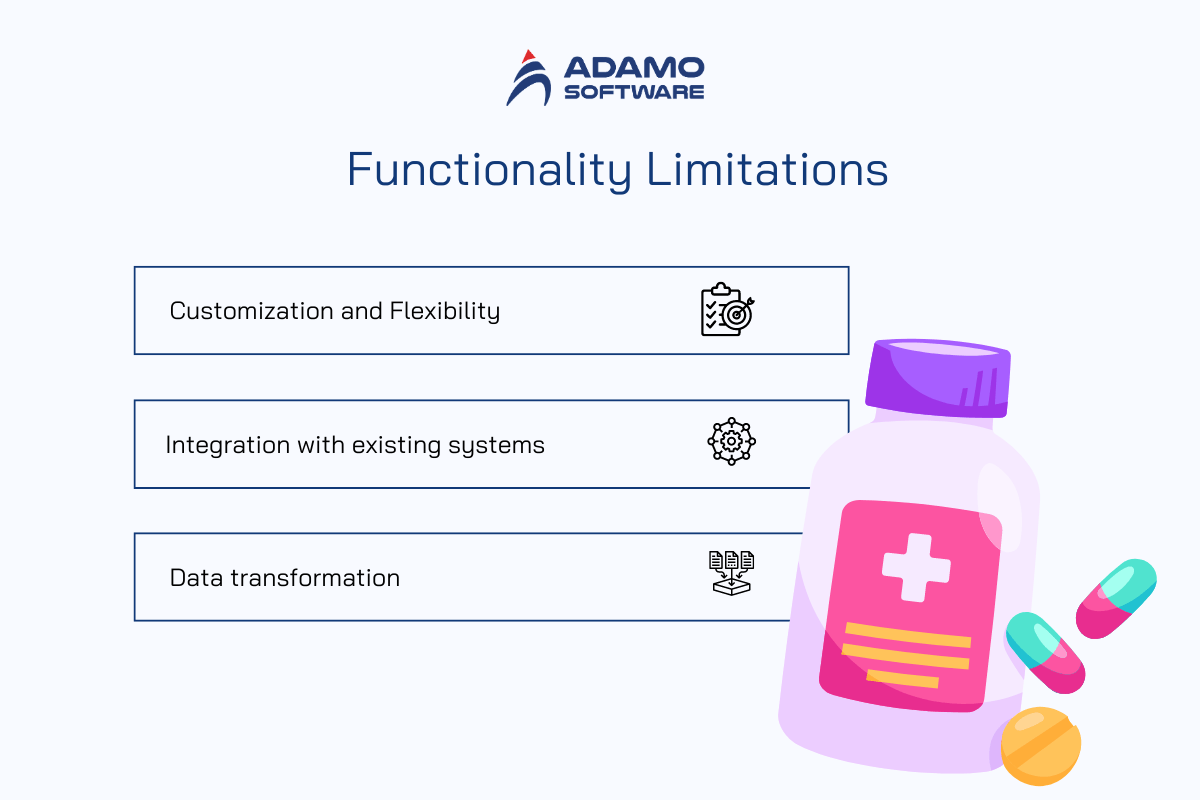
- Customization and Flexibility
Healthcare cloud services often provide standardized solutions. This may not perfectly align with the specific requirements and existing workflows of every healthcare organization. Besides, cloud computing in healthcare may not be fully effective in meeting specific clinical and administrative needs of healthcare organizations due to limited customization options.
- Integration with existing systems
Not all cloud computing solutions are suitable for legacy data storage systems. This leads to fragmentation of data storage and workflow for medical facilities. Besides, integrating healthcare cloud services with existing systems is complex, time-consuming, labor-intensive, and expensive, requiring significant information technology resources and expertise.
- Data transformation
The amount of data in the medical industry is huge, including information about patients, disease diagnoses, diagnostic images, videos, etc. Therefore, transforming information to the cloud can be slow and difficult.
3. Reliability and Downtime
Cloud computing in healthcare does not always run smoothly. It can experience outages or downtime, which can be caused by hardware failures, software bugs, network issues, or cyberattacks. Besides, the regular maintenance of healthcare cloud services by cloud service providers can also lead to temporary unavailability of services. Additionally, when the Internet connection is lost, the medical facilities will not be able to access the data system on cloud computing. These outages and downtime caused by the above factors can disrupt various healthcare services, leading to operational inefficiencies. Besides, clinical decision-making and patient outcomes can also be impacted due to the delay of access to critical patient data, diagnostic tools, and treatment plans. To deal with these problems, you must have a backup plan to access patient data in case you cannot connect to the cloud.
In addition to the three challenges above, the use of healthcare cloud services also faces problems in data ownership and management. Besides, the lack of technical experts, and resource expansion and management are other issues. By solving all these difficulties, healthcare providers can maximize the benefits of cloud computing in healthcare.
VI. How Adamo Services Help You Tackle Challenges in Healthcare Cloud Computing?
Are you having problems using healthcare cloud services in your healthcare facility? Are you looking for a unit that can help you tackle challenges in healthcare cloud computing? If yes, then Adamo Software may be your ideal choice.

With a team of experienced and professional experts, we are confident in providing impressive healthcare software solutions that enable optimum medical care and clinical outcomes. Telehealth/ telemedicine solutions, remote patient monitoring, on-demand healthcare solutions, and wearable medical devices, are valuable solutions that we offer. Here’s how Adamo can help you with your probems.
- Enhancing data security and privacy
- Ensuring integration and interoperability
- Optimizing performance and reliability
- Managing costs efficiently
- Enhancing data ownership and control
- Providing robust support and maintenance
Still confused about choosing a unit to help you solve your cloud computing problems for your medical facility? Don’t hesitate to contact us for a consultation.



